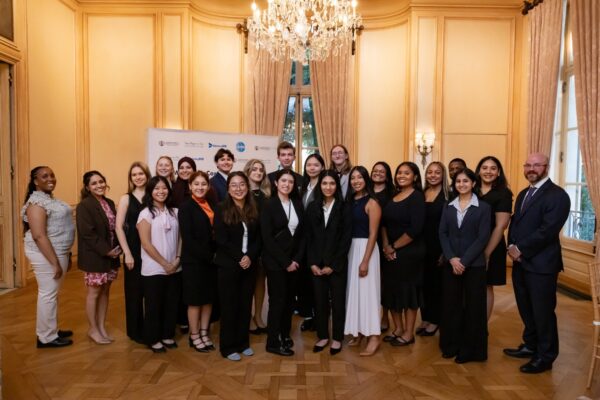2025 Meridian-Cox Foreign Service Fellowship for Emerging Leaders

Project Objectives
The 2025 Meridian-Cox Foreign Service Fellowship for Emerging Leaders brought 20 outstanding college students to Washington, DC, in June 2025 for a fully funded enrichment and training program designed to increase awareness of Foreign Service careers among students nationwide.
Generously underwritten by the Una Chapman Cox Foundation, this program is a collaboration between Meridian International Center, the Una Chapman Cox Foundation, and Community Colleges for International Development. The fellowship blends diplomatic skills training with practical learning experiences and valuable networking opportunities, preparing students with the knowledge and confidence needed to thrive in the Foreign Service.
Project Design
During a week of immersive programming in the nation’s capital from June 22–28, the program highlighted the essential roles of Foreign and Civil Service Officers, introduced key pathways into the Foreign Service, and equipped fellows with foundational soft skills critical to success in diplomatic careers.
Through a focused three-day diplomatic skills training course—featuring tailored workshops, activities, and hands-on learning—fellows built the core interpersonal and professional skills central to diplomacy. Led by Ambassador Bernadette Meehan and Miriam Magdieli, these included sessions on Diplomacy 101, cross-cultural communication, and negotiation. The training brought in current and former U.S. diplomats, Mr. T’Errance Favors, Ms. Julie Sherbill, and Mr. Ricardo Zuniga to connect classroom learning with practical application through firsthand accounts from diplomatic professionals.
The fellows also heard from a plethora of current and former U.S. ambassadors and diplomats with sessions on U.S. Department of State 101, Skills for Success in the Foreign Service, and a “What Do I Do” Foreign Service Officer panel.
Through a Soft Power Simulation and an International Water Crisis Diplomacy Simulation, the fellows experienced the complexities of diplomatic negotiations, exploring how competing interests, effective teamwork, and cultural sensitivity shape responses to global challenges.
The fellows also participated in a leadership workshop and networking luncheon with 15 visitors from Guinea, Kenya, Mauritania, Nigeria, Rwanda, Togo, Tunisia, and Zimbabwe participating in an International Visitor’s Leadership Program exchange that is also administered by Meridian. The exchange sparked rich cross-cultural dialogue and offered the fellows firsthand perspectives on life abroad and the diverse ways global challenges are understood and addressed around the world.
During their visit to the Peace Corps, the fellows engaged in a conversation with CEO Dr. Allison Greene and other leaders who shared insights on the transformative impact of Peace Corps service. The discussion highlighted the organization’s unique approach to grassroots diplomacy and its long-standing emphasis on building community partnerships through sustained, people-to-people engagement.
As part of their immersion in Washington’s diplomatic landscape, the fellows visited the Embassy of Malaysia, where they explored the core functions of an embassy and gained insights into the priorities shaping U.S.–Malaysia relations.
Through “speed convening” small-group meetings, students learned of pathways, fellowships & study abroad opportunities, hearing from representatives from the Embassy of Japan JET program, Institute of International Education Gilman & Boren Scholarships, American University School of International Service, Cultural Vistas, and Amideast.
During their visit to the U.S. Department of Commerce, the fellows met with representatives from three U.S. foreign service agencies: the Foreign Commercial Service, the Foreign Agricultural Service, and the Animal and Plant Health Inspection Service. They learned how each agency advances U.S. foreign policy by promoting international trade, safeguarding agricultural health, and supporting global food security.
At the United Nations Information Center, the fellows met with Director William Davis for an in-depth discussion on the UN’s mission, the structure of the multilateral system, and the organization’s role in addressing global challenges through diplomacy, development, and international cooperation. The session also highlighted internship and career opportunities within the UN and its specialized agencies.
The program hosted a networking reception that brought the Meridian-Cox Foreign Service Fellows together with scholars from the Institute for Responsible Citizenship, college students, and young professionals with international affairs practitioners from both the public and private sectors. The event offered fellows a chance to put their newly developed networking skills into practice by engaging with peers and professionals, while exploring diverse pathways to careers in international affairs. Ambassador Jo Ellen Powell, Executive Director, Una Chapman Cox Foundation, Frank Justice, Vice President, Open Diplomacy Programs, and 2025 Meridian-Cox Fellow Isha Mankar delivered remarks during the reception.
Impact
The Meridian-Cox Foreign Service Fellowship for Emerging Leaders cultivates the next generation of skilled and knowledgeable leaders, equipping them with the modern expertise needed to address complex global issues and strengthen America’s Foreign Service.
The 2025 cohort of 20 students representing 12 different states, and 18 unique higher-education institutions, including seven community colleges.
Project summary
| 2025 Meridian-Cox Foreign Service Fellowship for Emerging Leaders | June 2025 | |
|---|---|
| Regions: | Western Hemisphere |
| Countries: | United States |
| Impact Areas: | Youth Leadership Development |
| Program Areas: | Diplomatic Engagement |